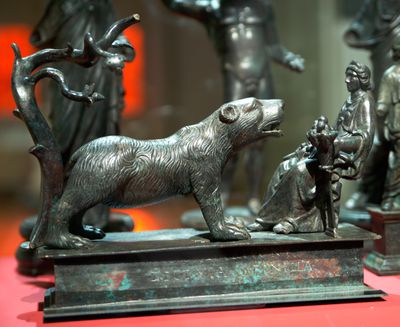「アルティオ」の版間の差分
| 3行目: | 3行目: | ||
== 名前 == | == 名前 == | ||
| − | アルティオ(''Artiō'')はケルト語で「熊」を意味する''artos'' (cf. 古アイルランド語''art'', 中期ウェールズ語''arth'', 古ブルトン語''ard'') に由来し、原インド-ヨーロッパ語 *''h₂ŕ̥tḱos'' (「熊」) から来ている。 | + | アルティオ(''Artiō'')はケルト語で「熊」を意味する''artos'' (cf. 古アイルランド語''art'', 中期ウェールズ語''arth'', 古ブルトン語''ard'') に由来し、原インド-ヨーロッパ語 *''h₂ŕ̥tḱos'' (「熊」) から来ている。*''Arto-rix''(「熊王」)として再構築されたケルト語の形態は、ラテン語化した形態*''Artori(u)s''を介して、Arthurの名前の源である可能性があります。 |
2022年11月20日 (日) 17:07時点における版

アルティオ(Artio、ガロ・ローマ宗教ではDea Artio)はケルトの熊の女神である。特にスイスのベルンでは、彼女の崇拝の証が発見されている。彼女の名前は、ガリア語で「熊」を意味するartosに由来する[1]。
名前
アルティオ(Artiō)はケルト語で「熊」を意味するartos (cf. 古アイルランド語art, 中期ウェールズ語arth, 古ブルトン語ard) に由来し、原インド-ヨーロッパ語 *h₂ŕ̥tḱos (「熊」) から来ている。*Arto-rix(「熊王」)として再構築されたケルト語の形態は、ラテン語化した形態*Artori(u)sを介して、Arthurの名前の源である可能性があります。
The Gaulish theonym Artiō derives from the Celtic word for the 'bear', artos (cf. Old Irish art, Middle Welsh arth, Old Breton ard), itself from Proto-Indo-European *h₂ŕ̥tḱos ('bear'). A Celtic form reconstructed as *Arto-rix ('Bear-King') could be the source for the name Arthur, via a Latinized form *Artori(u)s. The Basque hartz ('bear') is also presumed to be a Celtic loanword.テンプレート:Sfnテンプレート:Sfn
Attestations
A bronze sculpture from the Muri statuette group, found near Bern in Switzerland, shows a large bear facing a woman seated in a chair, with a small tree behind the bear. The woman seems to hold fruit in her lap, perhaps feeding the bear.[2] The sculpture has a large rectangular bronze base, which bears the inscription "Deae Artioni / Licinia Sabinilla" ("To the Goddess Artio" or "Artionis", "from Licinia Sabinilla"). If the name is Gaulish but the syntax is Latin, a dative Artioni would give an i-stem nominative *Artionis or an n-stem nominative *Artio. That would perhaps correspond to a Gaulish n-stem nominative *Artiu.
Other inscriptions to the goddess have been discovered in Daun (CIL 13, 4203), Weilerbach (CIL 13, 4113), Heddernheim (CIL 13, 7375 [4, p 125]), and Stockstadt (CIL 13, 11789).[3]
References
- Bibliography
- Corpus Inscriptionum Latinarum (CIL) vol XIII, Inscriptiones trium Galliarum et Germaniarum
- テンプレート:Cite book
- Deyts, Simone (1992) Images des Dieux de la Gaule. Paris: Editions Errance. ISBN 2-87772-067-5.
- Green, Miranda (1992) Animals in Celtic Life and Myth. London: Routledge. ISBN 0-415-18588-2
- テンプレート:Cite book
- Wightman, E. M. (1970) Roman Trier and the Treveri London: Hart-Davis. ISBN 0-246-63980-6
External links
テンプレート:Celtic mythology (ancient)
- ↑ Adrian Room, Placenames of the World: Origins and Meanings of the Names for 6,600 Countries, Cities, Territories, Natural Features, and Historic Sites, McFarland, 2006, p. 57.
- ↑ Deyts p. 48, Green pp. 217–218
- ↑ CIL XIII